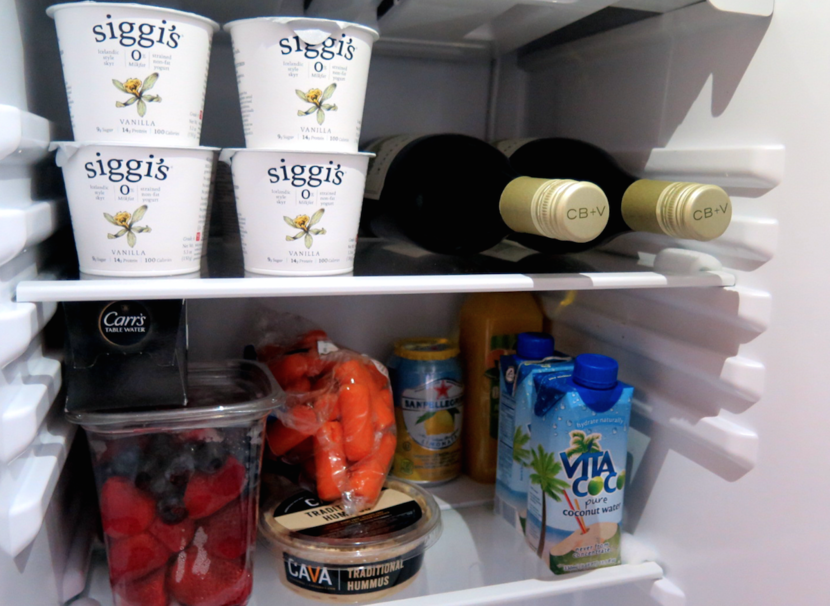Every year, over 1.3 billion tons of food grown for humans is wasted. That’s an entire third of the food supply. To put that number into perspective, imagine going to the grocery store with two of your roomies—you all get your groceries, but one roommate immediately throws their food out after paying at the register. That’s insane. Not to mention, the number of people that wasted food could have fed is heartbreaking. Food waste is also one of the largest contributors of methane emissions in North America, causing the atmosphere to get real toasty. Luckily, there are lots of ways to reduce food waste and the best of them are listed below.
1. Write Down What You Already Have in the Fridge

Hang a mini whiteboard on the outside of your fridge and write down exactly what you’re tossing in it every time you come home from grocery shopping or whenever you make leftovers. Then, promise yourself, or your roommates, or your cat, or whoever you need to that you will not go buy more food until all of the food on that list is used up.
If all you have left is half of an onion, that does not mean you have to go munch on that solo, but then when you do go out shopping, buy ingredients that you can combine with that onion before it goes bad.
Half of the time I’ve had to throw food away is because I forgot about it at the back of the fridge only to find it turning a funky shade of green two weeks later. With the whiteboard, I know exactly what’s in there and can use it before it goes through a Shrek-style transformation. Best of all, it saves me money and from eating so many ramen noodles that I actually become one.
2. Shop With a List

Use those handy study plan skills you’ve worked so hard on to map out what you’re going to eat for the week ahead. You’ll know exactly what you’re going to be tossing in the cart once you get to the store and how it’s all going to fit together. Use a food website (like say, Spoon University?) to get recipe inspo before you head out and you’ll be tweeting your meals to Gordon Ramsay in no time.
This step saves you from throwing out food you bought on impulse and is one more thing you won’t have to think about at the end of a hard day of studying. Or as I prefer to call it, “watching cooking videos while pretending to study.”
3. Cook at Home

As much as treating yourself to lunch on campus or dinner out with friends is great, the money spent on eating out adds up faster than a white girl can take a selfie in good lighting. (Count me guilty for both.) Eating out is more than just expensive, though. A study out of Ohio State University found that people who chef it up at home waste only 3 percent of the food they make while those who eat out waste on average 40 percent. That’s a pricey 37 percent increase, economically and environmentally.
By cooking at home, you reduce food waste, help the environment, and master your kitchen skills for impressing friends, S.O.’s, and maybe even your mom. It’s a win-win all around.
4. Show Ugly Produce Some Love

Over 6 billion pounds of produce are thrown out every year because of “aesthetic flaws.” It’s the equivalent of farmers, grocers, and consumers all declaring a collective “outfit not on fleek” towards produce that didn’t meet perfect aesthetic standards despite being completely safe and delicious otherwise. That’s 6 billion pounds of food that could be feeding the 16 million kids who go hungry in America every year. Ridiculous. You shouldn’t judge a book by its cover, so why judge a banana by its peel?
5. Shop Locally

While the idea of food miles has been contested, shopping locally makes it easier to get fresh food that hasn’t been transported thousands of miles into our reusable shopping bags and as a result, is less likely to go bad as quickly and become wasted food. It also gives regular shoppers like you and me more influence over how the food in our area is grown and gives our local economies an IRL Venmo.
Attending the Sunday farmer’s market is not only good for your Insta stories, but also for buying smaller amounts more frequently. If I have less in my fridge at any given time, I’m less likely to waste it because I know it’s all that I have to eat.
6. Know That “Best Before” Dates Are Fake News

While that carton of chunky milk might actually be too far gone to safely eat (just, ew), the majority of the things in your kitchen will be fine after the date posted on them passes. Those numbers actually have little to do with when your food is going to be unsafe to eat, and more to do with when food is at peak freshness.
The predicted shelf-life on items is largely unregulated in America and is set to be smaller than needed so that companies can have a higher turnover of food. Mo’ waste = mo’ money.
Next time you’re not sure if food is good or not, trust your own judgment call about its smell, consistency, and taste, or check out this handy guide for when your food really expires.
7. Don’t Forget About Composting

Once you’ve used up all of the edible parts of your food, make sure to toss them into the compost instead of the garbage. Many areas are starting to implement regional composting, but if that doesn’t happen to be in your area, fear not.
Often farmers’ markets accept food scraps, or learn how to compost in your own tiny abode (dorms included). If you’re composting at home, you probably won’t want to mix in dairy and meat scraps (that sh*t smells absolutely rank), but there are many large-scale composting programs that do accept those things.
Keep in mind, composting shouldn’t be your main strategy for reducing food waste because in reality, it won’t undo that forgotten moldy onion in the back of the fridge. (It’s OK, everybody makes mistakes, everybody has those days.) However, it will help decrease the size of local landfills and the greenhouse gases they emit.
8. Vote For Food Waste Policies
Individual action is rad AF when it comes to food waste, and to pretty much anything worth doing. But, at the end of the day, using your voice and your vote to make a change on a big scale is the best thing you can do. Sign petitions to encourage grocery chains like Whole Foods and Walmart to sell ugly produce at a discount, write to your local government representative about sustainable policies, or vote for those that already have the earth in mind.
While the food waste problem might seem bigger than that forehead zit you can’t stop fixating on, these are easy steps to reduce food waste. Not only will following them reduce methane emissions, climate change, and waste (just to name a few), they can also save you some serious dough that you can spend on way better things than food in the trash.


